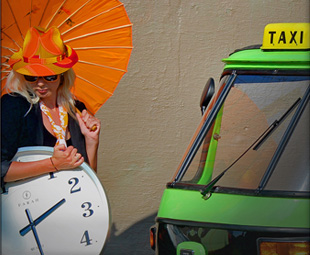Cry the beloved tuk-tuk

My blood is boiling. And the tuk-tuks – or rather the lack thereof – are the reason why.
Cape Town has put the brakes on tuk-tuks – and I fear that Johannesburg may, rather stupidly, follow suit. In a recent letter to Business Day, Ismail Vadi, Gauteng MEC for roads and transport, conceded that tuk-tuk services are a feasible and cost- effective mode of public transport. “They contribute to job creation and commuter mobility,” he noted rather wisely. It is for these reasons that the National Land Transport Act (2009) included tuk-tuk services as a credible form of public transport.
Vadi warns, however, that tuk-tuks must operate within a regulated environment. “The routes on which tuk-tuks travel must be in line with the transport plans of city authorities. Tuk-tuk services must have precise points of origin and destination, including adequate parking facilities,” he notes.
For tuk-tuk services to operate lawfully, they must apply to the Gauteng Provincial Regulatory Entity (PRE) for an operating licence, which must satisfy the following requirements:
• Submission of a valid South African identity document. In the event that the applicant is a non-citizen of South Africa, a valid work permit must be submitted
• A certificate of compliance from the South African Bureau of Standards
• A valid tax clearance certificate
• The driver must be in possession of a valid driver’s licence of appropriate class, eg motorcycle driver’s licence
• Fire extinguishers and first aid kits to be in the vehicles at all times
• Safety belts (driver and passengers) to be in proper working condition
• The tuk-tuk must be roadworthy and serviced at regular intervals
“These measures are necessary for proper administrative and safety controls in relation to this form of public transport. At the same time, PRE must ensure that tuk-tuk routes do not encroach on the legal routes of other public transport operators such as minibus taxis, metered taxis and buses, so as to avoid unhealthy competition and conflict,” notes Vadi.
In theory, I am on his side. We want safe and efficient public transport. But, as Marks Rapoo, director of the Rustenburg Rapid Transport (RRT), points out, the Bill of Rights insists on “movement within the country” – a rather odd way of referring to reliable public transport. The RRT has interpreted this as meaning that the service should be there when you need it, where you need it, on a regular, reliable, universally accessible and affordable basis – and so it is rolling out an integrated public transport system with bus rapid transport trunk corridors, direct bus routes and feeder routes to serve the city. That all sounds very cool – the RRT’s media releases describe the system as “state-of-the-art” (probably my least favourite term).
But goodness gracious me. We are a third-world country. Yes, we are! We need to get from A to B – affordably and safely. Tuk-tuks do that.
They also stop people from driving drunk. Now I know precisely what you’re thinking: when you go to a braai, don’t have a couple of beers if you’re planning to drive. This makes perfect sense – drinking and driving don’t go well together. But, in reality, this DOES happen. On a daily basis! While the tuk-tuks could never stop drunken drivers from taking to the roads, they would most certainly alleviate the problem in the suburbs. (Incidentally, I am not being elitist. I do know that we have huge problems in the rural areas too.)
But no. Government talks about regulating the tuk-tuks. And probably regulating them out of business. Instead of picking on the tuk-tuks, why not start with the taxis? I am fed up with the lawless drivers on the roads (some of whom are taxi drivers), who drive on the wrong side of the road – often almost having head-on collisions with drivers going in the legal direction.
Tuk-tuk drivers don’t do that. Maybe because they are too afraid of dying? After all, they are not afforded a huge amount of protection in a tuk-tuk (yes I know the purists will say the same applies to the passengers).
I am incensed with drivers (some of whom are taxi drivers) who deliberately go through red traffic lights.
Tuk-tuks don’t do that.
I hate it when I see drivers (some of whom are taxi drivers) overtaking on
the verge.
Tuk-tuks don’t do that.
And I think it is ridiculous to say that tuk-tuks should not compete with other forms of transport. Why on earth not? They compete in Thailand – very successfully. In fact, maybe they have driven down the cost of taxi fares there (what many tourists don’t realise is that it’s often cheaper to take a taxi).
Tuk-tuks do a lot of good. We need them. Please don’t let them die.
Published by
Focus on Transport
focusmagsa





 !
Starting 1 April, every
!
Starting 1 April, every


 FUSO: Driving the Future of Mobile Healthc
FUSO: Driving the Future of Mobile Healthc



 A brand
A brand




 Wondering about the maximum legal load for a
Wondering about the maximum legal load for a 
 The MAN hTGX powered by a hydrogen combus
The MAN hTGX powered by a hydrogen combus


 Exciting News for South African Operators
Exciting News for South African Operators



